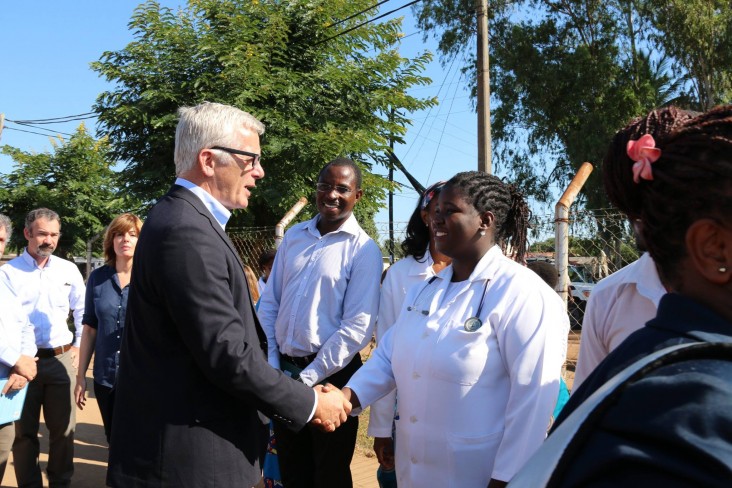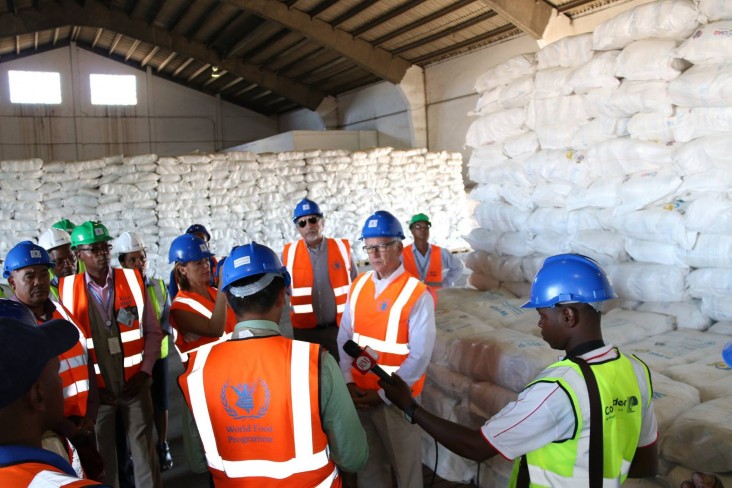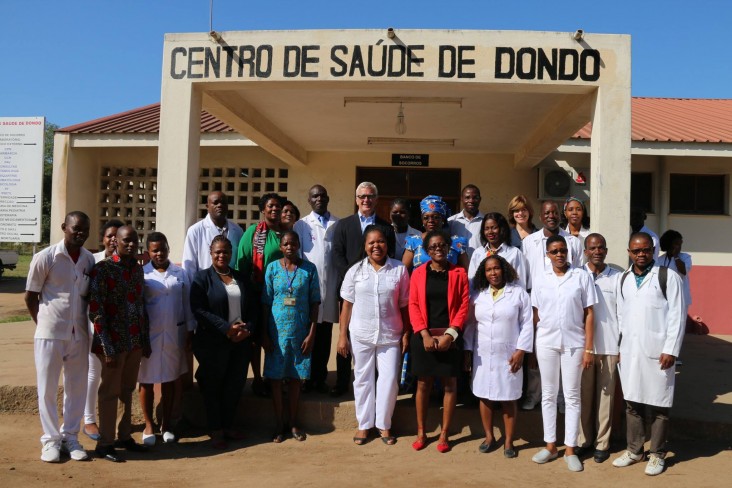
Ambassador Dean Pittman in Sofala Province Visits USAID emergency food, HIV/AIDS, maternal and child health projects
MAPUTO - U.S. Ambassador to Mozambique, Mr. Dean Pittman, visited Sofala Province from 16th to 18th of May 2017 to meet officials and survey US assistance to the Province. US Agency for International Development (USAID) officials, Alonzo Wind, USAID Southern Africa Acting Mission Director, and Theodora Dell, USAID Mozambique Acting Deputy Director accompanied the Ambassador as part of the U.S. delegation.
Ambassador Pittman visited a broad array of humanitarian assistance and development programs that receive U.S. Government (USG) support through USAID, the Presidential Emergency Plan for Aids Relief (PEPFAR), and the Centers for Disease Control and Prevention (CDC), as well as the U.S. Department of Defense. US Government assistance is benefitting nearly 70,000 households in the province where food security and livelihoods were adversely affected in the past by conflict and severe and prolonged drought.
Sofala is a coastal province at the center of the country and a major transportation and trade hub anchored by the country´s busiest port at Beira. The interior of Sofala is also home to one of Africa´s most important national parks at Gorongosa. Sofala is a USAID focus province for treating and preventing HIV/AIDS, malaria, and TB control, improving maternal and child health, building resilience to weather shocks, growing agriculture and food security, promoting protection of the national park and livelihoods linked to it, and transparent and democratic governance. Because of the port, Sofala is also a hub for US emergency food and logistics assistance in times of disaster.
HIGHLIGHTS

World Food Program Warehouse in the Port of Beira
Among the largest multi-purpose container terminals in Mozambique, the Port of Beira is a hub for World Food Program (WFP) commodities. Due to its capacity of 400,000 TEUs (Twenty-foot Equivalent Units) per year, this facility has received more than 150,000 metric tons of food for Mozambique, Malawi, Zambia, and Zimbabwe since last year. WFP implements activities funded by the U.S. President's Emergency Response for AIDS Relief (PEPFAR) and by USAID Food for Peace. These activities allow vulnerable Mozambicans to cope with food scarcity, malnutrition, and natural disasters, such as drought. In Sofala alone, U. S. Government assistance benefits more than 70,000 families.
USAID Emergency Food Distribution Site
USAID provides funding to World Vision to provide emergency food and nutrition assistance to drought- affected populations in Mozambique. Together with partner Food for the Hungry, this assistance is targeting 13,000 affected households in the districts of Dondo and Caia which were heavily impacted by the El Nino-induced drought that began in 2015. In addition to food distribution, USAID supports the provision of vouchers for the purchase of local food, the distribution of seeds, repair of infrastructure, and temporary shelter. The nutritional status of children and others at risk is monitored at the food distribution sites.
USAID Food for Assets in Dondo District
Through Food for Assets funded by USAID´s Food for Peace Program individuals in a community work to create, rehabilitate or maintain shared public infrastructure and are paid in the form of sorghum and dried legumes. A longer-term strategy to build food security in the face of drought is promoting orange flesh sweet potato cultivation under the Food for Assets activity.

Visit to Dondo Health Center
The Dondo Health Center is supported by USAID´s Maternal and Child Survival Program which is training health workers in life-saving interventions such as the prevention or treatment of post-partum hemorrhage and eclampsia--major causes of maternal mortality which is high in Mozambique. Interventions at the clinic to address nutrition, immunization and other treatments critical to maternal or child health are integrated with community health outreach to mothers and children under five. Dondo Clinic sees an average of 350 expecting mothers and delivers 240 babies per month.
Visit to Orphans and Vulnerable Children Programs
With funding from PEPFAR, USAID provides social and economic support to orphans and vulnerable children in areas with a high burden of HIV and AIDS. A school site visit illustrates USAID work with World Education to support Child Protection Committees on case management and home-based support for AIDS-affected children. Another visit to a site for a pilot program called DREAMs, shows how mentors and peer educators support adolescent girls, whether in or out of school, to cope with and avoid risks to their health and well-being.







Comment
Make a general inquiry or suggest an improvement.